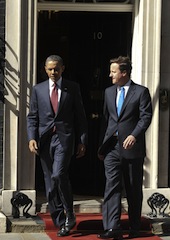The Republican War On the Poor
How credible are the Republicans claims that they support the poor?
September 22, 2013

The Grand Old Party of the current Republicans claims to be a populist party, one which supports the interests of common Americans. It claims to achieve this by reducing taxes, implementing strict budget controls and minimizing the role of government, while supporting individual rights and freedom of choice and responsibility.
The GOP also claims, somewhat magically, to protect the vulnerable from abuse and intrusion. It purports to do so, for example, by its stringent opposition to abortion. But how credible are Republican claims to support the lives of vulnerable Americans, when examined under closer scrutiny?
When it comes to America’s working-poor, the Republican Party has demonstrated its willingness to expose them to more hardship and misery. At the end of the last session of the U.S. Congress, Republicans broke with decades-old legislative agreement and decided to strip food stamps (SNAP) from the farm bill.
That measure narrowly passed on a party-line vote. Last Wednesday, House Republicans voted to reduce food stamps by $40 billion over ten years, again on a party-line vote.
Not to be blamed for inaction or a lack of determination, the next day House Republicans voted to link the defunding of health care for Americans to their budget bill, or force a shutdown of the government. Their fall back is worse and more catastrophic: defund Obamacare or bring about the first deliberate default on the country’s debt obligations.
These actions are only the most recent in a long-established pattern of Republican attempts to use the legislative branch to trigger wealth transfers from the poor in favor of powerful interests. Take Big Agribusiness, which Republicans like to protect. In that big-business world, fraud and abuse are much more prevalent than in the SNAP program.
The GOP also has a solid history voting against legislation supporting maternity care, children’s health insurance and unemployment assistance, all at the expense of the powerless. This constitutes a war on the poor.
Sadly, not just for show-and-tell purposes
These legislative actions are not without direct consequences. Ever wondered why the United States has the highest infant-mortality rate among the G-7 group of industrialized nations?
According to World Bank data, the U.S. performance on this critical score is approximately equivalent to that of Bosnia and Serbia, two countries that are still emerging from devastating civil war.
The most recent available data from the U.S. Department of Health and Human Services, in 2009, ranks the United States 27th out of 30 Organization for Economic Cooperation and Development (OECD) countries in infant mortality rates.
The U.S. performance protecting the lives of poor children is also abysmal. According to the most recent UN Children’s Fund (UNICEF) Report Card 11, in an analysis of 35 rich countries, the United States ranks second-to-last in both the relative childhood poverty rate and the relative childhood poverty gap.

How did Americans fall to the bottom? A key reason is that one-half of the U.S. Congress has declared war on the government, and that war plays out as a war against the poor. It is time that we Americans as a nation wake up to these sad realities – and confront what is a key cause for that unacceptably poor performance.
Why worry about the poor?
Why should one worry about the poor, especially poor children? For reasons of enlightened self-interest: given better opportunities, a large segment of the population could contribute more meaningfully to the economy and the tax base.
Republicans should just ask themselves this question: What will happen to future contributions to the pension system (i.e., their own money) – if one-third of the nation never escapes the ranks of poverty?
An investigation of legislation related to maternity care, children’s health care and SNAP (food stamps) from the 111th-113th Congresses (2009-2013) reveals how cruel policy has thrown away the poor in favor of partisan purity, ideology and budget-policies favoring the wealthy at the expense of the poor.
Such policy has followed a dogmatic orthodoxy that blames the poor for their misery and refuses the moral responsibility for charity and the role of government to care for its people.
The Republican Party has constantly opposed children’s healthcare, efforts to reduce deaths from childbirth, infant mortality and risk factors from premature births, as equally as it opposes programs to assist the hungry and unemployed.
The voting records and amendments offered in Congress provide ample and incontrovertible proof of intransigence toward the poor.
The consistent and persistent voting record against the needs of mothers and children, and the poor more broadly, is astonishing. The partisan nature against legislative initiatives to help them and in favor of bills that damage their lives is undeniable. Republicans put Americans in bread lines and take away the bread!
Minority hardball
Consider a few emblematic examples of what the implacable minority has blocked and what legislation a minority faction advances.
Perhaps the worst is the ironically named Supplemental Nutrition Assistance Program Improvement Act of 2013, which mocks the meaning of “improvement.”
The intention of the bill is to restrict access to assistance and reduce participation by mandating still higher levels of poverty to qualify. The justification is to reduce government spending. The bill has the following effects, derived from the maxim that the poor are dependent and irresponsible:
- It amends the Food and Nutrition Act of 2008 to limit SNAP eligibility to households receiving certain other cash benefits.
- It eliminates or disqualifies benefits to those who receive help because they also have other needs. For example, this provision mandates that if a family is sufficiently poor to qualify for energy assistance, the bill makes that family ineligible to receive food assistance as well, forcing poor families to choose between energy and food.
- It reduces funding for FY 2013 employment and training programs.
- It defunds grants for health insurance exchanges, defunds programs for prevention and public health that would restrain the growth of private healthcare costs, and defunds qualified non-profit health providers.
- It rescinds provisions in Medicaid and SSA intended to prevent states from excluding and reducing qualified groups from eligibility for state-funded or state-matched programs, including CHIP.
In addition, the Reauthorization for the Children’s Health Insurance Program (CHIP) barely passed in 2009. All the “no” votes in the House and Senate were Republican. The Hunger Free Schools Act would provide children from poor families with meals through school programs. The bill is stalled in committee and has no Republican co-sponsors.
Bills to protect women in childbirth have also been stalled. Recall also that the Republicans held up the reauthorization of the Violence Against Women Act for 18 months over objections to protections for immigrants and Native American women.
The purportedly strongest nation in the world risks trampling on the weakest of its citizens. Armed with empty ideology, the Republican Party hacks away at the nation’s core and its future.
Takeaways
One-half of the U.S. Congress has declared war on the government and it plays out against the poor.
Republican voting records in Congress provide proof of intransigence toward the poor.
The Republican Party has demonstrated its willingness to expose the working poor to more hardship and misery.
The US performance on infant mortality is equivalent to that of Bosnia and Serbia.
Republicans attempt to trigger wealth transfers away from the poor toward powerful interests.
Fraud and abuse are much more prevalent in agribusiness than in the SNAP program.
Republicans put Americans in bread lines and take away the bread!
Given better opportunities, much of the population could contribute to the economy and the tax base.

